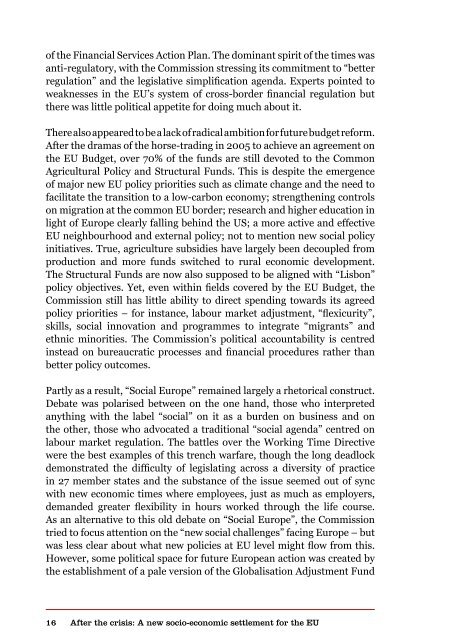Authors Iain Begg | Gabriel Glöckler | Anke Hassel ... - The Europaeum
Authors Iain Begg | Gabriel Glöckler | Anke Hassel ... - The Europaeum
Authors Iain Begg | Gabriel Glöckler | Anke Hassel ... - The Europaeum
Create successful ePaper yourself
Turn your PDF publications into a flip-book with our unique Google optimized e-Paper software.
of the Financial Services Action Plan. <strong>The</strong> dominant spirit of the times was<br />
anti-regulatory, with the Commission stressing its commitment to “better<br />
regulation” and the legislative simplification agenda. Experts pointed to<br />
weaknesses in the EU’s system of cross-border financial regulation but<br />
there was little political appetite for doing much about it.<br />
<strong>The</strong>re also appeared to be a lack of radical ambition for future budget reform.<br />
After the dramas of the horse-trading in 2005 to achieve an agreement on<br />
the EU Budget, over 70% of the funds are still devoted to the Common<br />
Agricultural Policy and Structural Funds. This is despite the emergence<br />
of major new EU policy priorities such as climate change and the need to<br />
facilitate the transition to a low-carbon economy; strengthening controls<br />
on migration at the common EU border; research and higher education in<br />
light of Europe clearly falling behind the US; a more active and effective<br />
EU neighbourhood and external policy; not to mention new social policy<br />
initiatives. True, agriculture subsidies have largely been decoupled from<br />
production and more funds switched to rural economic development.<br />
<strong>The</strong> Structural Funds are now also supposed to be aligned with “Lisbon”<br />
policy objectives. Yet, even within fields covered by the EU Budget, the<br />
Commission still has little ability to direct spending towards its agreed<br />
policy priorities – for instance, labour market adjustment, “flexicurity”,<br />
skills, social innovation and programmes to integrate “migrants” and<br />
ethnic minorities. <strong>The</strong> Commission’s political accountability is centred<br />
instead on bureaucratic processes and financial procedures rather than<br />
better policy outcomes.<br />
Partly as a result, “Social Europe” remained largely a rhetorical construct.<br />
Debate was polarised between on the one hand, those who interpreted<br />
anything with the label “social” on it as a burden on business and on<br />
the other, those who advocated a traditional “social agenda” centred on<br />
labour market regulation. <strong>The</strong> battles over the Working Time Directive<br />
were the best examples of this trench warfare, though the long deadlock<br />
demonstrated the difficulty of legislating across a diversity of practice<br />
in 27 member states and the substance of the issue seemed out of sync<br />
with new economic times where employees, just as much as employers,<br />
demanded greater flexibility in hours worked through the life course.<br />
As an alternative to this old debate on “Social Europe”, the Commission<br />
tried to focus attention on the “new social challenges” facing Europe – but<br />
was less clear about what new policies at EU level might flow from this.<br />
However, some political space for future European action was created by<br />
the establishment of a pale version of the Globalisation Adjustment Fund<br />
16<br />
After the crisis: A new socio-economic settlement for the EU

















